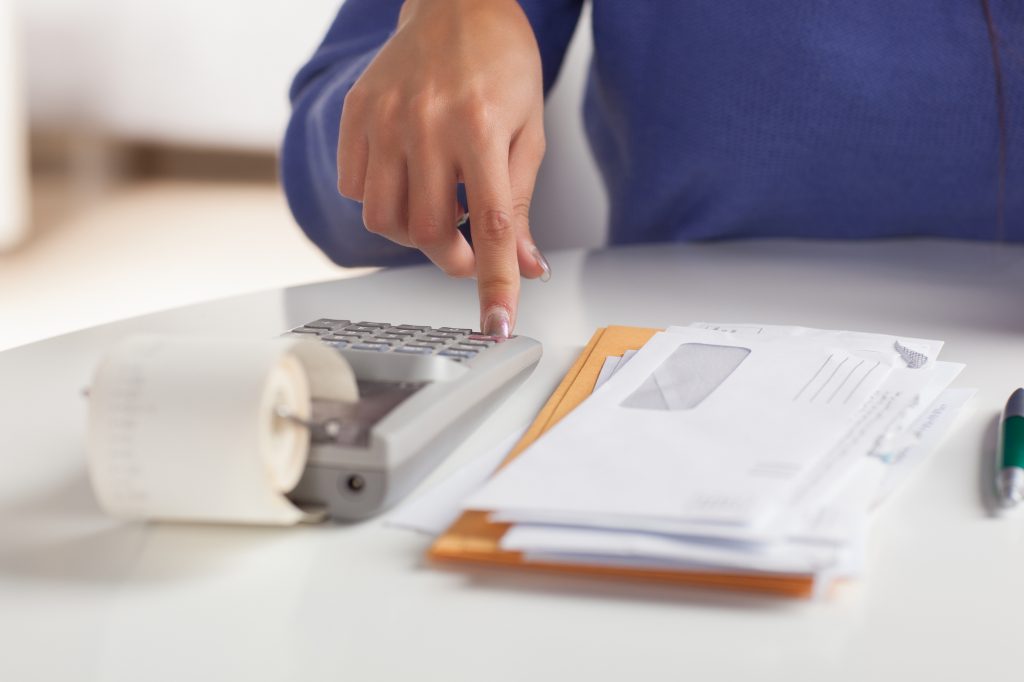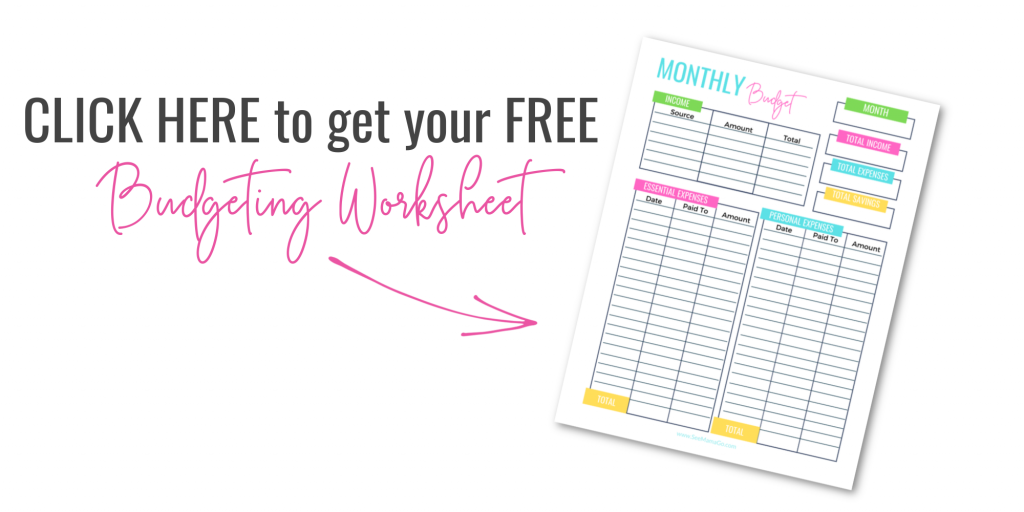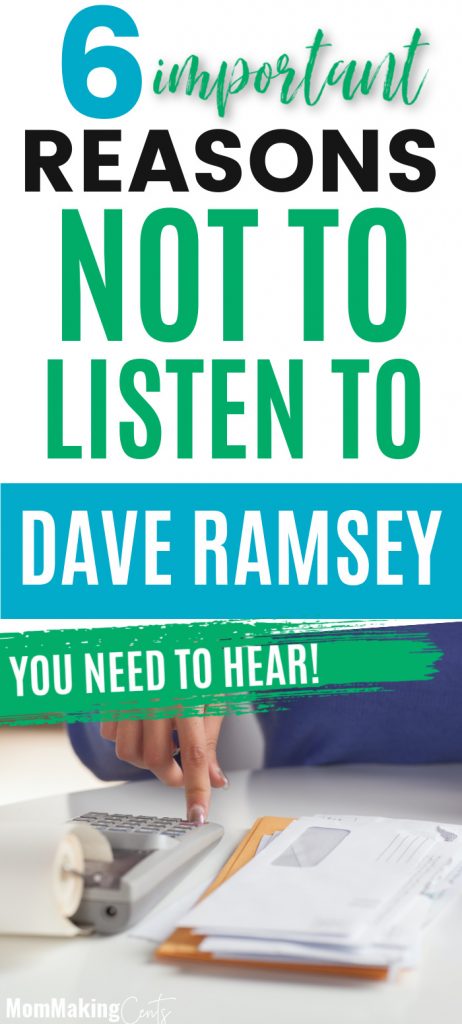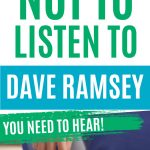Living debt-free sounds wonderful. And many do that by following Dave Ramsey’s advice. But here are some examples of when NOT to listen to Dave Ramsey.

When You Shouldn’t Listen to Dave Ramsey’s Advice
Dave Ramsey is known for being a financial genius and getting thousands of people out of debt.
But while I agree this guy really knows what he’s talking about, there are a few certain times I would not take Dave Ramsey’s Advice.
Let me just clarify by saying, I agree with pretty much everything he says. I’ve read his Total Money Makeover and applied the 7 baby steps to my own life. So I’m not bagging on Dave! I just think his advice could use some tweaks.
Like everything in life, nothing is cookie cutter. So what might really work for some people, may not work for others. No one should ever follow a program 100% unless it was specifically made for them.
With that being said, there are a few select pieces of Dave Ramsey’s 7 baby steps to a debt-free life that I think you should reconsider.
6 Things Dave Ramsey gets wrong
Not everyone falls into the same category as their finances. So some of these ideas may be great, but here are some examples of when not to follow his advice, and why.
1 – Never Use a Credit Card
Credit cards can get people into a lot of trouble. I’ve been there myself when times got tough. And getting out of debt can seem impossible. But the card is not the problem, the responsibility of the card is.
Credit cards are a great way to establish credit and let’s face it, we all need good credit scores. Sure, if you make millions of dollars as Dave Ramsey does, then a good credit score isn’t a big deal.
But for the rest of us, having a good credit score is like a security blanket everyone needs. You never know when you might need a loan.
Or when a good bad credit score (or no credit score) can actually work against you.
Plus, using credit cards can actually help you SAVE money if you are responsible with them. I use a Southwest Airline Card to build airline points on things I charge.
I always pay off the card at the end of the month (responsible!) and the miles help me save money when I need to travel.
Some credit cards give cash back, or money towards gas and groceries. By not taking advantage of that, you could be leaving free money on the table.
2- Save $1,000 before the next step
When was the last time an ’emergency’ cost less than $1,000? If you are a homeowner, you know very well $1,000 doesn’t get you much.
Need a new appliance? Or a new AC unit? You better have more than just $1000 set aside to cover those costs.
Or what about car maintenance? Dave recommends you buy a car in cash, even if it’s an old clunker.
Do you really think that if that old clunker breaks down or needs any maintenance, it’ll be LESS then $1000? Ha! I don’t think so.
The truth is, $1,000 won’t really get you far these days. I would recommend saving a lot more than that. Otherwise, you’ll just end up charging it and not being able to pay for it.
Then you’ll be right back to where you started… in debt and never getting out.

3 – Cut back on retirement
Always always always at least match what your employer gives you. Yeah, you could use that money now to pay off debt.
But why miss out on free money? And not only that, but the money you do contribute is invested and grows over time.
4 – Pay everything off. Never get a Loan
Loans can actually be a good thing. Let’s take for instance a new car. Say you buy a car for $20,000 but the interest for a car loan is 0% (which happens quite often!). You have the cash for the full amount of the car so you want to pay it off… just like Dave Ramsey suggests.
But here’s the thing. If you get the loan and make payments over a couple of years, that big chunk of money you WERE going to put towards the car, can be invested instead.
So instead of just throwing all $20,000 at the car, put that $20,000 in the bank. Even a simple savings account will grow something over time.
Getting loans at no or very little interest can actually benefit you. You can save that money and invest it and make more money from it.
When I first started reading Dave’s Money Management advice, I had a few different credit cards. One had a really high-interest rate and the others were smaller amounts but only had like 4% interest rates (which is LOW for credit cards).
If I followed Dave’s advice, I would have paid off the smaller amounts first. Which also happened to be the lower interest rates. But meanwhile, my highest rate card would have been growing and growing.
Paying off the highest interest rates first always makes the most sense. Yes, paying off smaller amounts may seem great because you can actually pay off an entire card and feel pleased with your progress.
But what’s the point of paying off a card, just to have the same amount as debt you did (or maybe higher!) as when you started? All because that high rate card wasn’t getting the attention.
6 – Use the cash envelope system
Now, maybe the cash envelope system works for some people. But I also know only dealing in cash does NOT work for many others. You have to decide what’s right for you.
When I have cash in hand, it tends to disappear very quickly. And oftentimes, I don’t know exactly where it went. When I deal with my debit card, I can look at my statement and know exactly where each and every dollar was spent.
Instead, try using some apps on your phone that help you budget your money. Some of these apps even put your money into virtual envelopes. So you can still follow along with Dave Ramsey’s plan, while not actually dealing with cash.
Create a plan that works for you!
Dave Ramsey’s Total Money Makeover is a great plan. Many have followed it and many have benefitted from the steps. But not every person out there lives a cookie-cutter life.
Your situation and goals may be drastically different than someone else’s. You need to look at your own needs and figure out what works best for you.
Has Dave Ramsey’s Advice worked for you?
I’d love to hear what worked and what didn’t in the comments below!

Pin for later!


Leave a Reply